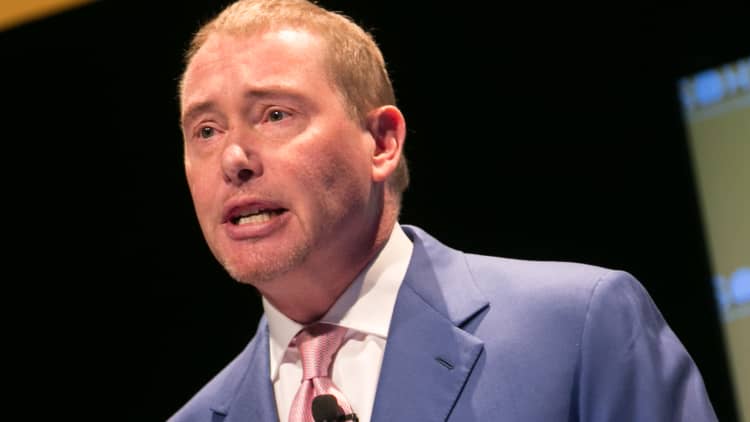
Like most of the bond market, Jeff Gundlach thinks the Federal Reserve will continue to raise interest rates this year. What's a little unusual is the way the bond guru, whose firm manages more than $100 billion, is playing the anticipated hikes in his DoubleLine mutual funds, and especially in the $3.1 billion SPDR DoubleLine Total Return Tactical exchange-traded fund Ticker (TOTL).
Gundlach, CEO of DoubleLine Capital, is betting that the best way to play the coming rate hikes is by holding lots of mortgages, which comprise nearly 60 percent of the holdings of the ETF. That includes residential mortgage bonds, commercial real estate debt and agency securities, according to the latest portfolio holdings disclosure from State Street, sponsor of the ETF. Gundlach has far fewer corporate bonds than the average for funds that track the Bloomberg Barclays U.S. Bond Aggregate Index, according to Morningstar, and far fewer Treasury securities.
Gundlach's two-year-old ETF returned 1.88 percent on an annualized basis from inception on February 23, 2015 through the end of February of this year, according to Morningstar, outperforming the Barclays U.S. Aggregate Bond Index (1.61 percent) and the Barclays Global Aggregate Index (0.70 percent). Gundlach outperformed even as he largely sat out a rally in corporate bonds, led by high-yield "junk" bonds. Credit risks proved to be overstated as the energy bust abated. Whether Gundlach's big mortgage bet is a good strategy now will depend on which types of income investments do best amid rising U.S. interest rates.
"Like other DoubleLine products, [the ETF] has relatively high exposure to mortgages. It's where their experience lies, and it offers something different than the Barclays aggregate," said Todd Rosenbluth, director of ETF and mutual-fund research at CFRA Research in New York.
The reluctance to hold corporate bonds is continuing to benefit Gundlach. "Last year they anticipated more volatility coming sooner and positioned defensively. But with the Fed raising rates more than once this year, this strategy is more appealing," Rosenbluth said.
One benefit of stacking up on mortgage bonds is that they are relatively short term, helping reduce the portfolio's risk of losing principal value as interest rates rise on other bonds. "We have one-third less duration risk than the aggregate average," Gundlach said in a March 7 webcast talking about one of his mutual funds, the Double Line Total Return Bond Fund, which has an even greater concentration of mortgages than the TOTL ETF.
The ETF's modified duration risk — a measure of sensitivity to interest rates — is about 15 percent lower than the benchmark.
Mortgage bond ETFs
| ETF | YTD performance (%) | 1-year performance (%) | Annual fee (%) |
|---|---|---|---|
| SPDR DoubleLine Total Return Tactical | 1.05 | 2.27 | 0.55 |
| Vanguard Mortgage-Backed Securities | 0.25 | 0.03 | 0.07 |
| First Trust Low Duration Mortgage | 0.43 | 5.03 | 0.65 |
| iShares CMBS | 0.35 | 0.96 | 0.25 |
| iShares Agency Bond | 0.36 | 0.07 | 0.2 |
| iShares Core U.S. Aggregate Bond | 0.4 | 0.39 | 0.05 |
Source: Morningstar.com, performance data through 3/20/2017
In general, Gundlach said he has been mostly negative on bonds since last July, and the defensive strategy has helped DoubleLine's flagship ETF beat its Morningstar benchmark, the Barclays U.S. Aggregate Bond Index, in the past six months, returning negative 0.78 percent, versus negative 2.08 percent for the Barclays U.S. Aggregate Bond Index, and negative 4.9 percent for the Barclays Global Aggregate, according to Morningstar data.
As rates rise, many factors will influence the performance of securities, including how the dollar reacts and how quickly the economy grows, Gundlach has said. And many of the choices Gundlach's ETF has made reflect his views of which types of income investments will do best in this environment.
Gundlach explained his negativity on corporate bonds — a view shared by other big-name investors — by saying, "There's not much juice left in the orange," because spreads between Treasuries and corporate bonds have moved so much already.
We have one-third less duration risk than the aggregate average.Jeff GundlachDoubleLine Capital CEO
He's also negative on European bonds and equities, reasoning that political risk in Europe is high and pointing to a big drop that has already occurred in French sovereign-bond values. He prefers bonds from emerging markets — the ETF, despite its U.S. focus, has about 10 percent of its assets in developing-market debt, the largest exposure coming from Mexico and Chile. About 0.76 percent of the portfolio is in India, and it has smaller positions in China, Malaysia and Indonesia.
"It's a U.S. vehicle with a sprinkling of emerging markets," Rosenbluth said.
More from ETF Strategist:
Getting the best of Buffett without paying a lot for it
A critical move to make before a market correction
Best reasons to keep betting on the rally not named 'Trump'
Income-oriented investors looking for bottom-line guidance can take this away from Gundlach: Manage risk by keeping maturities short, and focus on mortgages because a stable-to-brisk U.S. housing market is keeping risk under control.
But there is risk distinct from a core bond fund — risk is what investors pay Gundlach to take as an active manager. The TOTL ETF has an annual expense ratio of 0.55 percent, while the iShares Core U.S. Aggregate Bond ETF () charges 0.05 percent.
"It's a mortgage fund, so the risk that people will prepay their mortgages is something to consider," ETF.com analyst Sumit Roy said. "Gundlach doesn't see prepayment risk as particularly high right now, but if prepayments spike, there's a risk of losses for the fund."
One stat that is holding steady is the percentage of Americans who are delinquent on their mortgages, a metric whose spike in 2005–2006 was the early warning sign for the coming collapse of the housing-bond market. With unemployment low and incomes rising, if slowly, no near-term increase in delinquencies is obviously coming.
Mortgages are classified as a "less risk, less reward" investment by Vanguard, which offers the Vanguard Mortgage-Backed Securities ETF (VMBS) at an annual expense ratio of 0.07 percent. Vanguard's mortgage fund has trailed the Bloomberg Barclays Aggregate Index in the past year.
Risks for mortgage-backed bond investors
Prepayment risk: During periods of falling interest rates, homeowners refinance their mortgages before maturity dates, resulting in prepayment of mortgage-backed securities held by funds and causing the funds to lose any price appreciation above the mortgage's principal. Funds are also forced to reinvest the unanticipated proceeds at lower interest rates.
Extension risk: The chance that during periods of rising interest rates, homeowners will prepay their mortgages at slower rates. This will lengthen the duration or average life of mortgage-backed securities held by funds and delay a fund's ability to reinvest proceeds at higher interest rates.
Interest-rate risk: Described as "moderate" by Vanguard for its mortgage-backed ETF.
Income risk: Described as "moderate" by Vanguard for its mortgage-backed ETF.
Credit risk: Described as "very low" by Vanguard for its mortgage-backed ETF, due to investment in securities issued by the U.S. government or backed by it.
— By Tim Mullaney, special to CNBC.com
Correction: This story was revised to correct that DoubleLine Capital's Total Return Tactical ETF (TOTL) has outperformed benchmarks since its inception, and that the ETF has widely outperformed bond indexes in the past six months. An earlier version of this story misstated its performance. The headlines also were changed to reflect the extent of TOTL's investment in the mortgage market. TOTL is "betting big" on the mortgage market.




